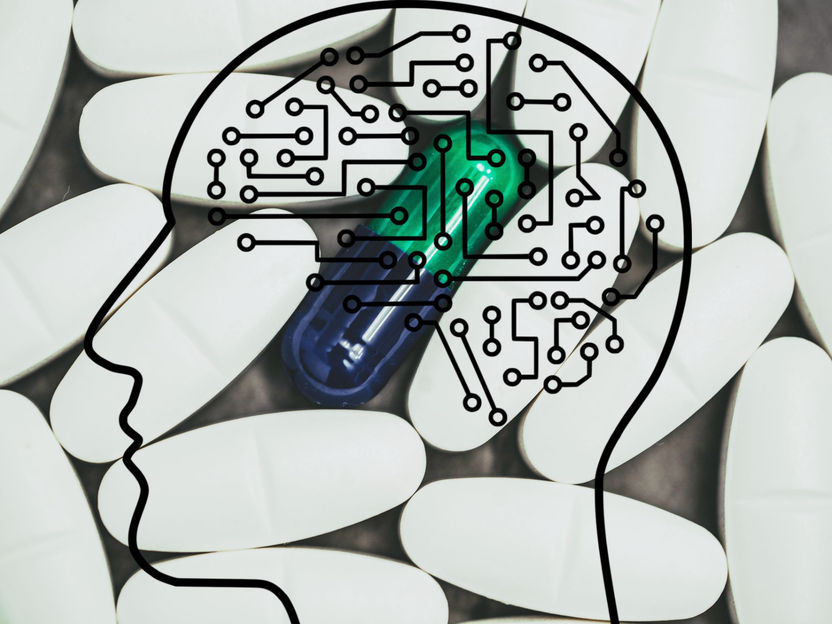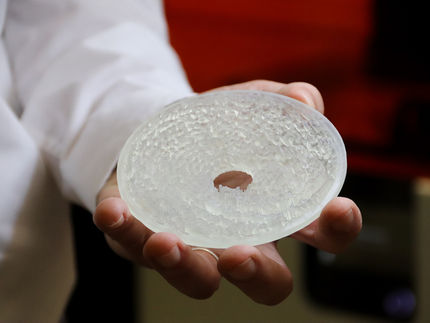Natural molecule could improve Parkinson's
The natural molecule, n-acetylcysteine (NAC), with strong antioxidant effects, shows potential benefit as part of the management for patients with Parkinson's disease, according to a study. Combining clinical evaluations of a patient's mental and physical abilities with brain imaging studies that tracked the levels of dopamine, the lack of which is thought to cause Parkinson's, doctors from the Departments of Integrative Medicine, Neurology, and Radiology, at Thomas Jefferson University showed that patients receiving NAC improved on both measures.

These are brain scans of a representative patient showing Dopamine transporter binding (red) before and after 3-month NAC treatment.
Thomas Jefferson University
Current treatments for Parkinson's disease are generally limited to temporarily replacing dopamine in the brain as well as some medications designed to slow the progression of the disease process. Recently, researchers have shown that oxidative stress in the brain may play a critical role in the Parkinson's disease process, and that this stress also lowers levels of glutathione, a chemical produced by the brain to counteract oxidative stress. Studies in brain cells showed that NAC helps reduce oxidative damage to neurons by helping restore the levels of the antioxidant glutathione. NAC is an oral supplement that can be obtained at most nutrition stores, and interestingly also comes in an intravenous form which is used to protect the liver in acetaminophen overdose.
"This study reveals a potentially new avenue for managing Parkinson's patients and shows that n-acetylcysteine may have a unique physiological effect that alters the disease process and enables dopamine neurons to recover some function," said senior author on the paper Daniel Monti, M.D., M.B.A., Director of the Myrna Brind Center of Integrative Medicine , and the Brind-Marcus Center of Integrative Medicine at Thomas Jefferson University.
In this study, Parkinson's patients who continued their current standard of care treatment, were placed into two groups. The first group received a combination of oral and intravenous (IV) NAC for three months. These patients received 50mg/kg NAC intravenously once per week and 600mg NAC orally 2x per day on the non IV days. The second group, the control patients, received only their standard of care for Parkinson's treatment. Patients were evaluated initially, before starting the NAC and then after three months of receiving the NAC while the control patients were simply evaluated initially and three months later. The evaluation consisted of standard clinical measures such as the Unified Parkinson's Disease Rating Scale (UPDRS), a survey administered by doctors to help determine the stage of disease, and a brain scan via DaTscan SPECT imaging, which measures the amount of dopamine transporter in the basal ganglia, the area most affected by the Parkinson's disease process. Compared to controls, the patients receiving NAC had improvements of 4-9 percent in dopamine transporter binding and also had improvements in their UPDRS score of about 13 percent.
"We have not previously seen an intervention for Parkinson's disease have this kind of effect on the brain," said first author and neuro-imaging expert Andrew Newberg, M.D., Professor at the Sidney Kimmel Medical College at Jefferson and Director of Research at the Myrna Brind Center of Integrative Medicine. The investigators hope that this research will open up new avenues of treatment for Parkinson's disease patients.
Original publication
Daniel A. Monti, George Zabrecky, Daniel Kremens, Tsao-Wei Liang, Nancy A. Wintering, Jingli Cai, Xiatao Wei, Anthony J. Bazzan, Li Zhong, Brendan Bowen, Charles M. Intenzo, Lorraine Iacovitti, Andrew B. Newberg; "N-Acetyl Cysteine May Support Dopamine Neurons in Parkinson's Disease: Preliminary Clinical and Cell Line Data"; PLOS One; 2016
Original publication
Daniel A. Monti, George Zabrecky, Daniel Kremens, Tsao-Wei Liang, Nancy A. Wintering, Jingli Cai, Xiatao Wei, Anthony J. Bazzan, Li Zhong, Brendan Bowen, Charles M. Intenzo, Lorraine Iacovitti, Andrew B. Newberg; "N-Acetyl Cysteine May Support Dopamine Neurons in Parkinson's Disease: Preliminary Clinical and Cell Line Data"; PLOS One; 2016
Topics
Organizations
Other news from the department science

Get the life science industry in your inbox
By submitting this form you agree that LUMITOS AG will send you the newsletter(s) selected above by email. Your data will not be passed on to third parties. Your data will be stored and processed in accordance with our data protection regulations. LUMITOS may contact you by email for the purpose of advertising or market and opinion surveys. You can revoke your consent at any time without giving reasons to LUMITOS AG, Ernst-Augustin-Str. 2, 12489 Berlin, Germany or by e-mail at revoke@lumitos.com with effect for the future. In addition, each email contains a link to unsubscribe from the corresponding newsletter.
More news from our other portals
Last viewed contents

Laboratory study: effect of antibodies against omicron variants BA.1 and BA.2 wears off quickly

Covid-19 can trigger diabetes - When SARS-CoV-2 infects beta cells, they produce less insulin and show signs of death
Spinifex to be acquired by Novartis - Australian pain drug innovation company sold to Novartis for US$200m plus milestone payments
New mechanism that leads to inflammation in rheumatoid arthritis discovered

Defined Blockade: Enzymatic photocaging for the study of gene regulation through DNA methylation
Category:Voice_disorders
Fusarium_oxysporum
Category:Indole_alkaloids

Scientists develop novel nanoparticles that could serve as contrast agents - Special feature: The properties of these unique nanoparticles change in reaction to heat






















































